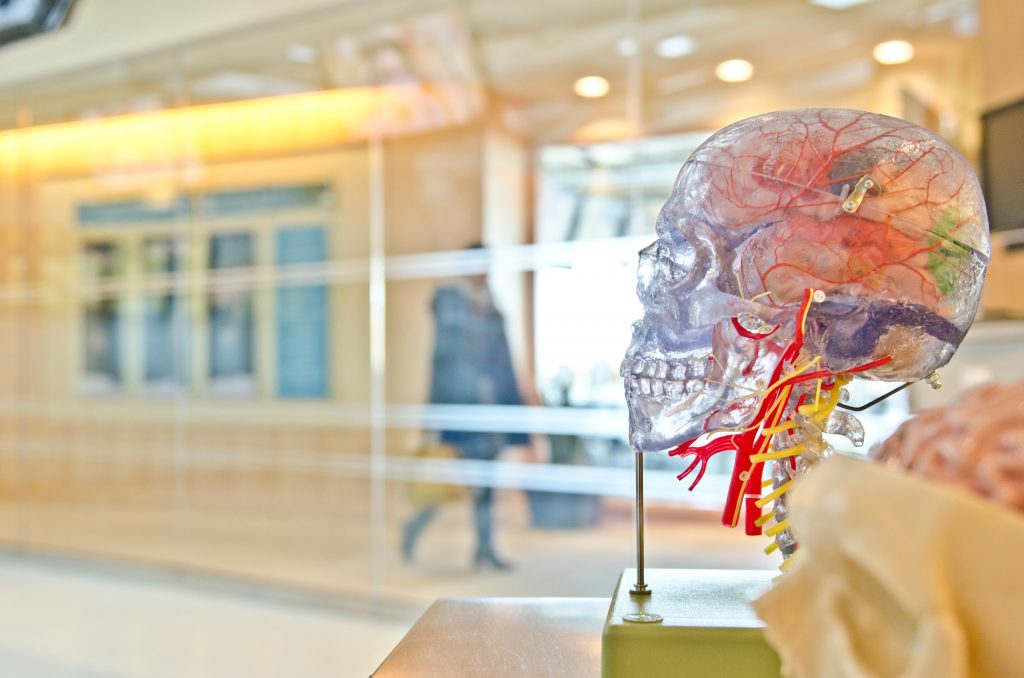At Cotter House Central Ohio, we endeavor to learn more about Alzheimer’s and Dementia in order to increase the quality of our care. When we understand what is going on in the brain, we are better able to understand the stages of Alzheimer’s and Dementia and how we can help. We aren’t the only ones who should understand, we want you to understand as well. In sharing information, we can help so many more seniors who suffer from these terrible diseases whether they are under Cotter care or living in their own home.
Brainstem: Includes the Medula Oblongata, Pons, and Midbrain
The brainstem is located at the bottom of the brain and connects directly with the spine. The brainstem has two main jobs. First, it controls automatic processes that are continuously occurring in our body without our conscious thought. This includes breathing, circulation, and digestion. Imagine how much more you would have on your mind if you had to consciously remember to breath, or keep your heart beating, or to call on your digestive system to finish the food in your stomach! Thankfully, the brainstem does this on its own allowing us the freedom to think about everything else. The second job of the brainstem is to route and filter information obtained from our sensory and motor nerves. In other words, when you touch something with your hand, it’s the brainstem that sends it on to the Thalamus for processing.

Cerebellum
The cerebellum is located in the back of the brain, just behind the brainstem. It also has two main jobs that it performs. It is responsible for motor control and motion memory, allowing us the freedom of voluntary movement such as walking and writing. When the cerebellum is damaged, people usually struggle to keep their balance and maintain coordination of tasks, especially running and writing.
Thalamus: Includes the Hypothalamus and Posterior Pituitary Gland
The thalamus is a router of sorts, taking data and moving it to the proper parts of the brain. It takes in all sensory information, translates it, and sends it to the correct portions of the brain. The hypothalamus controls keeping our body at regulated temperature. The hypothalamus is what keeps us at 98.6 when we are healthy and even brings the temperature up as a measure to kill bacteria and viruses. The posterior pituitary is in control of our hormones that get released into the body such as oxytocin and others to help keep the body healthy.
Cerebral Cortex: Includes the Frontal Lobe, Parietal Lobe, Occipital Lobe, and Temporal Lobe
One of the largest portions of the brain. The frontal lobe is in charge of executive function, emotional control, and speech. Essentially it helps us complete complex processes, problem solve, and express ourselves. The parietal lobe deals with processing our sensation information and reacting to our environment in real time. The occipital lobe processes our visual information. The Temporal lobe houses our ability to understand language, process what we hear and controls our memory.
Basal Ganglia – takes care of fine motor control. This is the part of the brain related to Parkinson’s Disease.
Left Brain – Analytical processes, Logic, Language, Reasoning
Right Brain – Creativity, Intuition, 3-D Forms, Imagination
Corpus Collosum – Connects the left and right hemispheres of the brain
How Alzheimer’s Affects the Brain
With all of this information, it’s important to understand how Alzheimer’s affects the brain. Alzheimer’s attacks the cells and neurons in the brain, keeping them from being able to communicate with one another. At first, Alzheimer’s typically attacks the memory centers in the temporal lobe. This causes the short and long term memory loss over time that is most associated with Alzheimer’s disease. As it spreads, it begins to affect other areas of the cerebral cortex including the structures responsible for language, reasoning (frontal lobe), and social behavior. As the damage brought on by Alzheimer’s continues, those suffering from the disease lose the ability to remember, communicate, and eventually can no longer function independently.
This story is more common than most of us realize. At Cotter House Central Ohio, we believe that everyone knows someone with Alzheimer’s and Dementia. Understanding how these diseases affect our brains can help us find better ways to counteract the effects. This is why we suggest the MIND Diet and use it in all of our kitchens and why we believe in early detection methods such as Cognivue to help spread awareness and give the most information possible to take care of our cognitive health moving forward.
